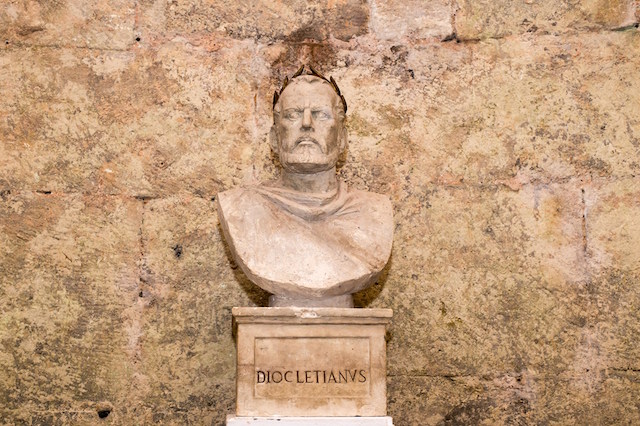Socialism isn’t new; it was even wrecking economies back in Ancient Rome.

Bust of Diocletian in Split, Croatia
In years of peace, Diocletian, with his aides, faced the problems of economic decay. To overcome depression and prevent revolution, he substituted a managed economy for the law of supply and demand. He established a sound currency by guaranteeing to the gold coinage a fixed weight and purity which it retained in the Eastern Empire till 1453. He distributed…
food to the poor at half the market price or free, and undertook extensive public works to appease the unemployed. To ensure the supply of necessaries for the cities and the armies, he brought many branches of industry under complete state control, beginning with the import of grain; he persuaded the shipowners, merchants, and crews engaged in this trade to accept such control in return for governmental guarantee of security in employment and returns.
The state had long since owned most quarries, salt deposits, and mines; now it forbade the export of salt, iron, gold, wine, grain, or oil from Italy, and strictly regulated the importation of these articles. It went on to control establishments producing for the army, the bureaucracy, or the court. In munition factories, textile mills, and bakeries the government required a minimum product, bought this at its own price, and made the associations of manufacturers responsible for carrying out orders and specifications. If this procedure proved inadequate, it completely nationalized these factories and manned them with labor bound to the job.
Gradually, under Aurelian and Diocletian, the majority of industrial establishments and guilds in Italy were brought under the control of the corporate state. Butchers, bakers, masons, builders, glass-blowers, ironworkers, engravers, were ruled by detailed governmental regulations. The “various corporations,” says Rostovtzeff, “were more like minor supervisors of their own concerns on behalf of the state than their owners; they were themselves in bondage to the officials of the various departments, and to the commanders of the various military units.” The associations of tradesmen and artisans received various privileges from the government and often exerted pressure upon its policies; in return, they served as organs of national administration, helped to regiment labor, and collected taxes for the state from their membership.
Similar methods of governmental control were extended, in the late 3rd and early 4th centuries, to provincial armament, food, and clothing industries. “In every province,” says Paul-Louis, “special procuratores superintended industrial activities. In every large town, the state became a powerful employer … standing head and shoulders above the private industrialists, who were in any case crushed by taxation.”
Such a system could not work without price control. In 301, Diocletian and his colleagues issued an Edictum de pretiis, dictating maximum legal prices or wages for all important articles or services in the Empire. Its preamble attacks monopolists who, in an “economy of scarcity,” had kept goods from the market to raise prices:
Who is … so devoid of human feeling as not to see that immoderate prices are widespread in the markets of our cities, and that the passion for gain is lessened neither by plentiful supplies nor by fruitful years?—so that … evil men reckon it their loss if abundance comes. There are men whose aim it is to restrain general prosperity … to seek usurious and ruinous returns. … Avarice rages throughout the world. … Wherever our armies are compelled to go for the common safety, profiteers extort prices not merely four or eight times the normal, but beyond any words to describe. Sometimes the soldier must exhaust his salary and his bonus in one purchase, so that the contributions of the whole world to support the armies fall to the abominable profits of thieves. [1]
The Edict was, until our time, the most famous example of an attempt to replace economic laws by governmental decrees. Its failure was rapid and complete. Tradesmen concealed their commodities, scarcities became more acute than before, Diocletian himself was accused of conniving at a rise in prices, riots occurred, and the Edict had to be relaxed to restore production and distribution. It was finally revoked by Constantine.
The weakness of this managed economy lay in its administrative cost. The required bureaucracy was so extensive that Lactantius, doubtless with political license, estimated it at half the population. The bureaucrats found their task too great for human integrity, their surveillance too sporadic for the evasive ingenuity of men. To support the bureaucracy, the court, the army, the building program, and the dole, taxation rose to unprecedented peaks of ubiquitous continuity.
As the state had not yet discovered the plan of public borrowing to conceal its wastefulness and postpone its reckoning, the cost of each year’s operations had to be met from each year’s revenue. To avoid returns in depreciating currencies, Diocletian directed that, where possible, taxes should be collected in kind: taxpayers were required to transport their tax quotas to governmental warehouses, and a laborious organization was built up to get the goods thence to their final destination. In each municipality, the decuriones, or municipal officials, were held financially responsible for any shortage in the payment of the taxes assessed upon their communities.

William and Ariel Durant
Since every taxpayer sought to evade taxes, the state organized a special force of revenue police to examine every man’s property and income; torture was used upon wives, children, and slaves to make them reveal the hidden wealth or earnings of the household; and severe penalties were enacted for evasion. Towards the end of the 3rd century, and still more in the 4th, flight from taxes became almost epidemic in the Empire. The well-to-do concealed their riches, local aristocrats had themselves reclassified as humiliores to escape election to municipal office, artisans deserted their trades, peasant proprietors left their overtaxed holdings to become hired men, many villages and some towns (e.g., Tiberias in Palestine) were abandoned because of high assessments; at last, in the 4th century, thousands of citizens fled over the border to seek refuge among the barbarians.
It was probably to check this costly mobility, to ensure a proper flow of food to armies and cities, and of taxes to the state, that Diocletian resorted to measures that, in effect, established serfdom in fields, factories, and guilds. Having made the landowner responsible through tax quotas in kind for the productivity of his tenants, the government ruled that a tenant must remain on his land till his arrears of debt or tithes should be paid.
We do not know the date of this historic decree; but in 332, a law of Constantine assumed and confirmed it, and made the tenant adscriptitius, “bound in writing,” to the soil he tilled; he could not leave it without the consent of the owner; and when it was sold, he and his household were sold with it. He made no protest that has come down to us; perhaps the law was presented to him as a guarantee of security, as in Germany today. In this and other ways, agriculture passed in the 3rd century from slavery through freedom to serfdom and entered the Middle Ages.
Similar means of compelling stability were used in industry. Labor was “frozen” to its job, forbidden to pass from one shop to another without governmental consent. Each collegium or guild was bound to its trade and its assigned task, and no man might leave the guild in which he had been enrolled. Membership in one guild or another was made compulsory on all persons engaged in commerce and industry, and the son was required to follow the trade of his father. When any man wished to leave his place or occupation for another, the state reminded him that Italy was in a state of siege by the barbarians and that every man must stay at his post.
~ Footnotes ~
[1] Some of the “ceilings” established in the Edict reveal the level of prices and wages in A.D. 301. Wheat, lentils, peas, $3.50 a bu.; barley, rye, beans, $2.10 a bu.; wine, 21-26 cents a pint; olive oil, 10.5 cents a pint; pork, 10.5 cents a lb., beef or mutton, 7 cents; chickens, 2 for 52.5 cents; dormice, 10 for 35 cents; best cabbage or lettuce, 5 heads for 3.5 cents; green onions, 25 for 3.5 cents; best snails, 20 for 3.5 cents; large apples or peaches, 10 for 3.5 cents; figs, 25 for 3.5 cents; hair, 5 cents a lb.; shoes, 62 cents to $1.38 a pair. Wages of farm labor, 23-46 cents, plus keep, per day; stonemasons, carpenters, blacksmiths, bakers, 46 cents plus keep; barbers, $1.75 cents per man; scribes, 23 cents per 100 lines; elementary teachers, 46 cents per pupil per month; teachers of Greek or Latin literature, or geometry, $1.84 per pupil per month; lawyers for pleading a case, $7.36.
Written by Will Durant and published by Foundation for Economic Education ~ May 31, 2018
~ The Author ~
Will Durant (1885–1981) was a writer, historian, and philosopher best known for his 11-volume work The Story of Civilization written in collaboration with his wife, Ariel.
